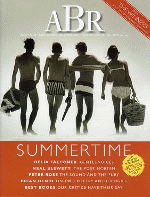
I hadn't specifically intended to write an introductory note to this weblog but the most recent issue of The Australian Book Review, Dec 2004-Jan 2005, No. 267, contains a lead essay by editor Peter Rose which raises a number of interesting questions, so you get one almost by default.
Originally delivered as the 2004 Barry Andrews Lecture at the University of New South Wales at the Australian Defence Academy, Rose's essay, titled "The Sound and the Fury: Uneasy Times for Hacks and Critics" addresses the general subject of reviewing and literary criticism: the type, the length and the purpose. Let me state at the outset that I don't consider myself a critic. I don't even consider myself a reviewer, just a lazy reader with some opinions who thinks he knows what he likes. I have no trouble in reading long critiques, short reviews, or hack jobs, so long as the piece is entertaining and gives me an idea of whether or not I should seek out the publication. And that last is the real point. I want to know if the reviewer liked the thing or not. Rose on the other hand states: "It all goes, I suppose, to the question as to where our greatest responsibility lies as critics. Is it to the reader, the author, posterity, one's literary editor, 'the market', one's nationality, the broader culture?" And having stated the question answers it with: "Well, I believe that our ultimate responsibility is to the work itself - the novel, the slim volume, the memoir, the play, the film - not to its hopeful maker, intended audience or national honour." Which confuses me somewhat.
The two most important parties in any reading experience (Rose includes plays and film here but I'm trying to simplify things a bit) are the authorial team (the writer, the editor, the publishers) and the reader. If the reader is to enjoy (assume this includes learn from, adore, or any other appropriate verb) then the authorial team has to get its act working properly. If that happens then it should find an appreciative readership - it may not, but it should. So the authorial team shouldn't, in my view, aim for a specific market. (If they get the package right the market will follow.)
The reviewer, however, has to. They need to place the work into a reasonable context - the general fiction landscape, the work's genre, the author's past work, and so on. I have severe limitations when it comes to reviewing - I read fiction for enjoyment in the first instance, if I learn something in the process then all the better, but it is not something I set out to achieve. Non-fiction tends to run the other way, with the proviso that if I don't enjoy it then I won't learn anything.
Rose continues later to add a bit of context to his previous statement when he says that the fundamental responsibility of a critic is "...to do justice to a book and to assess its contribution to our collective literature..." Which probably explains my confusion. That is something I cannot do as I don't have the knowledge or skills. All I can do is to assess whether or not it's worth spending your beer money to buy the work. That'll have to do.
You can get a bit of an idea of what sort of work is included in the current issue of the ABR on the web page. The page devoted to number 267 prints the Rose essay mentioned above, plus another 6 reviews out of the 33 included in the printed version. So it's a bit like other literary review journals out there on the web in that it provides a taster, an appetizer if you will. And let me tell you, it's a very comprehensive meal being offered in this magazine. There are reviews in the categories of Politics (3 reviews/5 books), Anthology (3/4), Journals (1/3), Garden History (1/2), Food (1/2), Memoir (5/6), Art (2/2), Fiction (5/9), Poetry (2/3), Music (1/2), Cultural Studies (2/2), Philosophy (1/1), History (2/2), Military History (1/1), True Crime (1/1), Children's Picture Books (1/3) and Young Adult Fiction (1/3). If you add to this 2 poems (by Clive James and John Slavin), Letters, National News, a Commentary piece, and Best Books and Best Children's Books selections, you'd be hard-pressed to find anyone who wasn't covered by at least one section here.
The fact that all items under review are "Australian" only adds to the feeling that this is a good piece of work. The reviewing is uneven, of course. I get the feeling in about half the pieces that the reviewer didn't know what to think, or, at least, they write like they don't. But that harks back to my preferred form of review rather than the intent of this magazine, so you can take that statement under advisement. I like this magazine. It covers the Australian literary scene pretty well. I would like more fiction reviews, but, as Rose states in his essay, they cover as much as they can, which amounts to about half the Australian fiction output each year. Better than all the newspapers in Australia put together I suspect.
